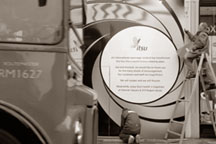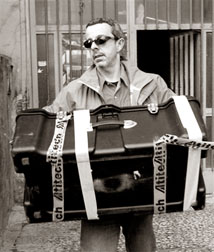|
observer |
|
|
|
|
|
OTHER LINKS |

|

|

|
Spy poisoning treated as murder
BRITISH police said Friday that they were now treating the death of poisoned former Russian spy Alexander Litvinenko as murder. "Detectives investigating the death of Alexander Litvinenko have reached the stage where it is felt appropriate to treat it as an allegation of murder," London police said. Britain's embassy in Moscow also announced small traces of radiation had been found on its premises, but said they were too small to be harmful and declined to say if the radiation was polonium - 210 - the poison found in Mr Litvinenko's body. Mr. Litvinenko, a fierce critic of President Vladimir Putin, began complaining of feeling ill on November 1. He died in London three weeks later from radiation poisoning. Mr. Litvinenko accused Mr. Putin of ordering his assassination. Russia denies any involvement but the case has created diplomatic tensions between Moscow and London. British police, which sent a team to Moscow to question witnesses who met Mr Litvinenko in London, said: "Detectives in this case are keeping an open mind and methodically following the evidence." "It is important to stress that we have reached no conclusions as to the means employed, the motive or the identity of those who might be responsible for Mr. Litvinenko's death."
In Moscow, British police and investigators from Russian Prosecutor-General Yuri Chaika's office today questioned Dmitry Kovtun, one of at least two Russians who met the ex-spy the day he fell ill. "One Russian citizen who was named in the inquiry of the British side was questioned," the Prosecutor's office said. Investigators met Mr. Kovtun in the same hospital where ex-KGB agent Andrei Lugovoy, a high-profile figure in the affair, was being treated, apparently for radiation poisoning. While admitting to meeting Mr Litvinenko in a London hotel on November 1, Mr. Lugovoy has denied any involvement in the ex-KGB spy's death. The small group of British detectives who arrived in Moscow on Monday were virtually relegated to the role of observers by Mr. Chaika who has publicly insisted Russian authorities will direct interviews on Russian soil. An Italian contact of Mr Litvinenko was today discharged from a London hospital which had been monitoring him for radiation poisoning. Mario Scaramella had been admitted to hospital last Friday after polonium-210 was detected in his body. Mr. Scaramella said he felt well after leaving hospital. |









